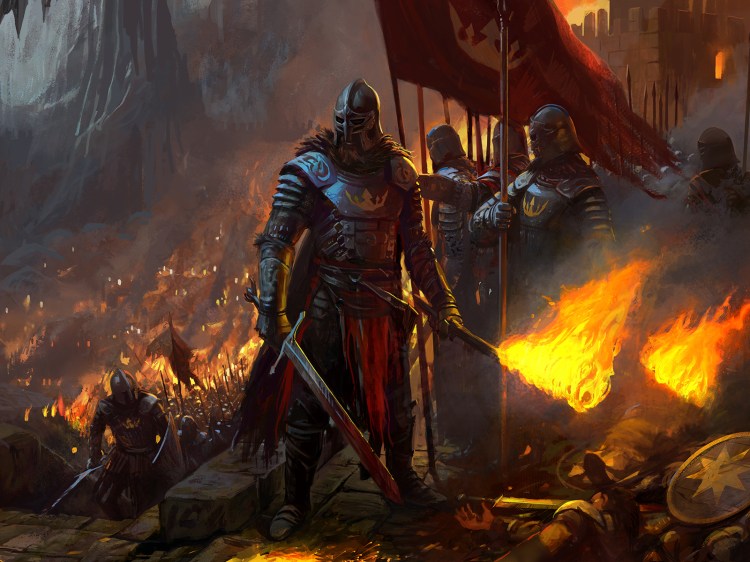Jeff Vogel: Everyone did that, and now there’s just a terrifying, soul-deadening number of indie games. I went to [PAX, the Penny Arcade Expo] a few months ago, and it has this area for the indie games that didn’t get in the PAX 10 [the 10 indie games judged to be best at the show]. That was full. There were like 80 games on show there, and a lot more games that were rejected, so they made, on another floor, another indie showcase area. Some indie people dropped the extra bucks and got their own booths.
So even with four full days of PAX, there was not enough time to acknowledge all of the indie games that were available.
It’s terrifying. I counted more than 100 indie games on show there. The video game industry does not need 100 games a year total. Let alone your roguelike 2D platformer puzzle-stealth game.
GamesBeat: If you had to do it again now, would you?
Vogel: If I was starting out today, I wouldn’t write an indie game. I’d go get a real job, because it’s so hard and so competitive. I feel really bad for them, because I was at PAX just looking at these young developers and the glow of love and energy in their eyes. It just did me good to be around them.
A lot of them will say, “I played your game when I was 8, and it made me dream of being able to do this!” And I’m like, “Yes, I am comically old, thank you.” But at the same time, it’s really heartening. It makes me feel like I may have accomplished something in this lifetime. It also makes me feel guilty, because good lord, it’s tough out there now.
GamesBeat: But perhaps they have the energy for it.
Vogel: I think you’re exactly right. It’s important to point out that in 1994, to make a living writing shareware, writing indie games, you might as well have just climbed Mt. Everest naked. When I started, the World Wide Web was not a thing. It existed, but nobody had heard of it. I got most of my early sales off [America Online], for the love of God. You got your shareware at a kiosk in the mall.
When I think about my days starting out, when I was just scrambling for individual sales on CompuServe and Prodigy [two dial-up online communities], and now young developers have Steam. Steam is a miracle wrapped in magic riding on the backs of unicorns.
The things that Steam does for you as a developer are astonishing. When I started out in the business, I needed the ability to take credit cards. I struggled for months to get someone to help me take credit cards, because nobody I talked to believed you could run a business on the Internet.
I had to hustle for months to get the ability to take credit cards. Not to mention maintaining our website, maintaining our servers, maintaining the infrastructure to distribute demos, marketing and sales and stuff like that on my own lonely website, running my own store — now Steam will just lift all of that off of you. God, it’s good.
It’s really hard to go to PAX and stand out from the crowd, but when I started out, we didn’t even have PAX. There were no video game conventions.
GamesBeat: You’ve managed to remain independent over the course of two decades, which suggests to me that you’re there because you want to be, not because you have to be.
Vogel: In 1997, when Exile III came out, it was by shareware standards just a radioactive explosive hit. It was making all kinds of money and getting all kinds of attention. This was when dot-com craze was taking off. Everyone was making a fortune. I was like, I could ride this rocket to the moon. I could get investors. I could build a company and get employees. It would be easy as pie.
And then I chose to not do that. Because … [Long pause] You know, people who make video games are artists. Artists have their own styles and work flows and ways they prefer to work. I feel that an artist’s way of working is sort of a sacred thing, and you can’t mess around with it. I work best when I go into a room and I shut the door and I code for a year, and I come out and I have a thing.
Of course, I’m not doing this by myself. My wife is a huge help. My contractors are a huge help. My volunteer beta testers are invaluable to the success of my business.
But I’m alone in a room, and I send requests out over email and then stuff comes back to me via email, and I’m still alone in a room. I’m not a hermit. I have family and friends. I just — I work alone. That’s just the way that the games come out of me.
Among the many bits of advice I have to young developers is, figure out how you work. Figure out what works for you. Then defend that. Stick by it.
If you catch lightning in a bottle and find a circumstance that enables you to create great work, if you find that you can only write games while wearing a Seahawks cap and lacy undergarments, then by God write all your games with the Victoria’s Secret stuff on.
VentureBeat's mission is to be a digital town square for technical decision-makers to gain knowledge about transformative enterprise technology and transact. Learn More



